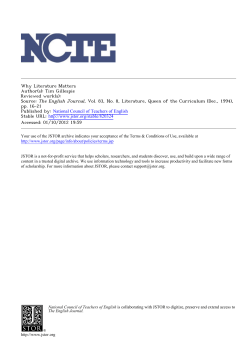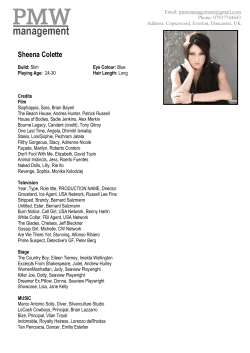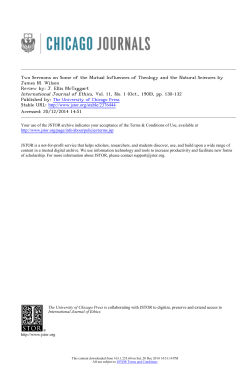
Why Literature Now? Author(s): Karen Newman Reviewed work(s): Source:
Why Literature Now?
Author(s): Karen Newman
Reviewed work(s):
Source: PMLA, Vol. 117, No. 3 (May, 2002), pp. 501-503
Published by: Modern Language Association
Stable URL: http://www.jstor.org/stable/823152 .
Accessed: 01/10/2012 19:53
Your use of the JSTOR archive indicates your acceptance of the Terms & Conditions of Use, available at .
http://www.jstor.org/page/info/about/policies/terms.jsp
.
JSTOR is a not-for-profit service that helps scholars, researchers, and students discover, use, and build upon a wide range of
content in a trusted digital archive. We use information technology and tools to increase productivity and facilitate new forms
of scholarship. For more information about JSTOR, please contact support@jstor.org.
.
Modern Language Association is collaborating with JSTOR to digitize, preserve and extend access to PMLA.
http://www.jstor.org
II7
3
|
Why Major in Literature-What Do We TellOur Students?
501
Now?
WhyLiterature
NOT BEINGAN EVANGELIST,
I WASN'T
surehow to respondto the question"Whymajor
in literature-what do we tell our students?"In
over twenty years of teaching and advising, I
have never sought to persuadestudentsto major
in any field.Occasionally,when a womanadvisee
who came to Brown to majorin physics or engineering has decided to shift to literature,I have
triedto talk aboutthe difficulties women face in
the sciences, the science classroom's chilly climate, and gendercompetitionto persuadeher to
stick it out andbecome the engineeror physicist
she wantedto be. But proselytize?Never.
But since I believe passionatelyin the power
and significanceof literature,I determinedto try
to write about why. There could be no moment
more appropriateto such a task thannow. I write
these words in the weeks following the attacks
on the WorldTradeCenterin New York;I write
as an intellectualand an academic,on sabbatical
in Paris, where I have come to finish a book on
early modern London and Paris and the impact
of urbanizationon cultural production:on theater,the book trade,readingpractices,urbanrepresentation, urbangenres. Distracted by death,
terror, anthrax, the bombings in Afghanistan,
and the news, compelled to "read"these events
as they are reportedand presented, I am as certain as I have ever been of the power and significance of literarystudy.
Why literaturenow? Because literatureinsists emphaticallythatwe readandinterpret,that
there are no easy answers,neveronly one meaning or perspective.Literatureinsists on interpretation, on point of view, on polysemy. How do
we address the question of meaning in today's
global world?What is rhetoric,and how does it
persuade? Rhetoric, writes Roland Barthes, in
"The Old Rhetoric: An Aide-Memoire,"one of
his most powerful and erudite essays, is a vast
empire.ThoughBartheswrites specificallyabout
rhetoric in the West, its imperial ambitions and
KAREN
NEWMAN
is University
Professor
andprofessorof comparative
literature
andEnHerbooksincludeShakespeare's
Rhetoric
of
glishat BrownUniversity.
ComicCharacter,
FashioningFemininityand EnglishRenaissance
Sheis at
Drama,andFetalPositions:
Individualism,
Science,Visuality.
workon a studyof the impactof urbanization
on culturalproduction
inearlymodernLondonandParis.
reach, the power of rhetoricis starklydisplayed
in ourcurrentglobal impasse.How do we understand and interpretwords like pro-choice, prolife, unborn child, fetus, author, text, terrorist,
freedom fighter, civilian, war, crime, crusade,
terrorism, martyr,suicide, propaganda, news,
fundamentalist,fanatic, God? These words and
how we understandthem and thousandsof others are critical in the root sense-they bear on
the crisis in which we findourselves.
The philosopher and culturalcommentator
RichardRorty has attackedliterarystudies over
the last several years, claiming that literatureis
in dangerof a fall into knowingness, "a state of
mind and soul,"accordingto him, "thatprevents
shuddersof awe and makes one immune to enthusiasm."Those of us who teach and study literature,he argues, have abandonedinspiration
for knowingness. But knowingness matters: it
makes readingand interpretationpossible.
While I drove my college-age daughterto
the airportnot long ago, she asked me if Shakespeare really wrote his plays. She was reading
Shakespearein a class in which the question of
his authorshiphad been discussed.On planes, in
dentists' offices, waiting in lines, when asked
what I do, if I say I teach Shakespeare, almost
invariablythe firstquestion anyone asks is, Did
Shakespearereally write his plays? What I answer, and what I said to her, is that theater in
Shakespeare's day was collaborative, that he
wrote plays with other people, that readers and
editors since have rewritten the plays as well,
502
0
w
I.0
0
.0
c
.on
u
Q,
+Ir
Why Major in Literature-What Do We TellOur Studerits?
but that yes, the man we call Shakespeare did
write much of the plays we call his. Virtually
every case made for putative authorship of
Shakespeare'splays is on behalf of a memberof
the educated Tudorelite-Francis Bacon, Viscount St. Albans; the earl of Southampton;Edward de Vere, the earl of Oxford. What makes
Shakespeare's authorship suspect is what we
would now term his class, or as The Reader's
Encyclopedia of Shakespeareputs it in describing the authorshipdebate,"[S]uchprofoundand
wide-ranging works could not possibly have
been written by an ill-educated man from the
country" (Campbell and Quinn 115). Generations of bardolatorshave not wanted to admit
that a man of the middling sort with no university education could have been the author of
Hamlet. I explained to my daughterthat grammar school in Shakespeare's day was different
from our modem counterpart-in a Tudorgrammar school Shakespeare would have learned
Latinand readthe classics. Many fewer men and
no women went to university then, and there
were many otherways of becoming educatedin
late-sixteenth-centuryLondon.
WhenI teachMacbeth,we discusshow Lady
Macbeth is made accountable throughher language for Macbeth'sactions.We study expectations for women in Shakespeare'sday. We look
carefully at the poetry, at how Lady Macbeth's
speeches produce her character and make us
judge her.My knowingness,as Rortycalls it, enables students to see that class and gender, race
andnationality,sexualityandreligionmatter,that
thereareno easy universals.Toimaginethatreading knowinglyprecludeswhatRortytermsinspirationbut what I would call aestheticpleasureis
mistaken.Rortyadvocatesthatwe literatureprofessors remainin a kind of perpetualadolescent
crush, gushing over the beauties of the greatcanonical authors,but any readerof Proustknows
that the recognition of blemishes and faults, venalityanderrorthwartsneitherpassionnorlove.
Nor is interpretationsimply a rationalchoice
or a smorgasbordwhere,as readers,we get to take
[ PMLA
our pick and fill our plates with whatever
we choose. Literaturedramatizesprecisely how
choices areshapedanddeterminedfor us through
words. Late in Henry James's The Ambassadors, Lambert Stretheris confronted by Chad
Newsome's sister SarahPocock, who has come
to Paris to bring Chad-and Strether-back to
Woollettand "save"themfromFrenchvice. Stretherasks her if she has not found Chadchanged:
"Youdon't,on yourhonor,appreciateChad'sfortunatedevelopment?"Mrs. Pocock exclaims, "I
call it hideous"(279-80). Hideous or fortunate?
Like Strether,we arecalled on to judge andinterpret,to readsigns andpersons;we learnaboutthe
limitationsof judgmentas we watch Strethersee
and not see. James'snovel dramatizesthe limits
anddifficultiesof thinkingandinterpreting,but it
does not allow us to choose Mrs. Pocock's view.
The readingof literatureteaches how interpretation is shapedand producedby nation, religion,
class-in short,discriminationsof all kinds.
Rortyis rightthatsome would makeof literatureandculturalstudies"onemoredismalsocial
science."But therehave alwaysbeen badreaders,
and in my experience they are often those most
prone to enthusiasms.What professor of literaturehasn'tbeen approachedby a scientistof one
persuasionor another-life, physical,or socialandbeen confrontedwith chargessimilarto those
Rortymounts:"Iloved literaturein college, it inspired me, so why can't I understandwhat you
are talking about?""What'swrong with the humanitiestoday?""Jargonis everywhere."I don't
expect to be able to understandthe most recent
workin visualperceptionor molecularbiology or
applied math, fields in which a specialized vocabulary and analytic precision are presumed.
Producing the study of literatureas inspiration
and mere appreciationhelps to justify inequities
in the allocation of resources in a global culture
whereinspiration,strongfeeling, andbelief without knowingness seem everywhereto lead to inequity,bigotry,hatred,anddeath.
By "knowingness"Rorty means to invoke
what he judges a fallen knowledge and to im-
I
7 .3
W iy Major in Literature-What Do We TellOur Students?
pugn what is sometimes united underthe heading "politicalcriticism."Perhapsno text I know
better exemplifies the refusal of the opposition
between knowingness and aesthetic pleasure
than Toni Morrison's brilliant Playing in the
Dark: Whitenessand the LiteraryImagination.
Her readings of Willa Catherand MarkTwain,
of Ernest Hemingway and Edgar Allan Poe reveal with extraordinarypower the significance
of racialist and racist thinking in the making of
Americanliterature,but at the same time Morrison demonstratesthe pleasures and intricacies
of the very texts she reads so knowingly. Her
book ends with these words: "All of us, readers
and writers, are bereft when criticism remains
too polite or too fearful to notice a disrupting
darknessbefore its eyes" (91). Knowledgeis unruly, its forms inextricable one from the other,
its productionthe result of intellectual labor as
well as of the pleasures of reading. If we are to
educate and be educated, to open the minds of
THE PROGRESSION FROM LANGUAGE
instruction or composition to the higher discipline of literatureis no longer the only or even
preferredpath everywhere. For example, MIT
stresses that its literatureprogramgoes beyond
the traditional:
others and to be open to new knowledge, we
must refuse simplistic oppositions: politics or
aesthetics, knowingness or inspiration,cultural
capitalor greatbooks. Read literaturenow.
503
rF
0a
'3
Io
We
T
U"
WORKS
CITED
(A
Barthes, Roland. "The Old Rhetoric: An Aide-M6moire."
The Semiotic Challenge. Trans. RichardHoward. New
York:Hill, 1988. 11-93.
Campbell, O. J., and EdwardQuinn, eds. The Reader's Encyclopedia of Shakespeare.New York:Crowell, 1966.
James,Henry.TheAmbassadors.Ed. S. P. Rosenbaum.New
York:Norton, 1964.
Morrison,Toni. Playing in the Dark: Whitenessand the Literary Imagination.Cambridge:HarvardUP, 1992.
Rorty, Richard. "Point of View: The Necessity of Inspired
Reading." Chronicleof Higher Education 9 Feb. 1996:
A48. First presented in a longer version at the MLA
Annual Convention. Hyatt Regency Chicago. 28 Dec.
1995.
5,
3
Do
WhyMajorin Literature-What
WeTellOurStudents?
RANDOLPH
D. POPE,
Commonwealth
Professor
of Spanishat the University
of Virginia,
has
writtenbookson Spanishautobiography
andon the Spanishnovelthe latest being UnderstandingJuan Goytisolo(U of South CarolinaP,
numerousarticles
on Spanishand LatinAmerican
litera1995)-and
The programin Literatureleading to the deture. He has been editor of the Revistade estudioshispdnicosfor over
gree of Bachelorof Science in Literatureis
a decade.Heis writinga bookon the newSpanishnarrative.
equivalentto the curriculain English(or literary studies)of the majorliberalartsuniversities. The Literaturecurriculumis notablealso
for its inclusion,alongwithtraditionalliterary
themes and topics, of materialsdrawnfrom jor in literature.The pitch is usually straightforward: the study of literatureprovides a superb
filmandmedia,frompopularculture,andfrom
minorityandethnicculture.
("Major") way to think aboutthe world;to study societies,
one's own and others;to improveone's capacity
There is only a fuzzy agreementaboutwhat
to express ideas concisely and effectively; and
we recommendwhen we invite a studentto mato gain access to a shared knowledge that is
© Copyright 2025





















